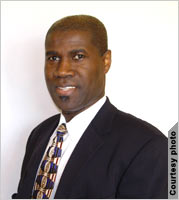[guest name="Francis V. Ero and Ingrid Ardjosoediro" biography="Entrepreneur Francis V. Ero is a business manager for the county of Kern in California and lives in Bakersfield. Ingrid Ardjosoediro is an agricultural economist, who works as a development specialist at Development Alternatives Inc., a consulting firm focused on development."]
America.gov asked finalists from among the more than 700 African immigrants who submitted business plans to the “African Diaspora Marketplace” to blog about their ideas. Sponsored by USAID and Western Union Company, the African Diaspora Marketplace is a contest that will award seed money to approximately 15 winners to help them bring their ideas to life in their home countries.
FRANCIS V. ERO, entrepreneur:

Francis V. Ero
AFAS Inc. operates a 17-pond fish farm in Badagry, Nigeria, which can produce up to 375,000 kg of catfish, tilapia and other fish types, depending on demand. It takes approximately six months for juvenile fish to reach market size, about 1.0 -1.5 kg. The market for catfish and tilapia is expanding, and AFAS has an established customer base in that market niche.
Our research shows that demand will continue to outpace supply for many years to come; the long-term outlook for this industry is phenomenal.
But supply is short for clear business reasons. High costs and meager supply of quality fish feed, along with a lack of private-sector funding and a lack of government support for fish-farming, have hindered the growth of the domestic aquaculture industry.
As AFAS plans to expand production to meet demand, it must overcome the limited supply and high costs of fish feed. Fish farming is capital intensive, and feed costs represent about 70 percent of production costs. That is why our company is seeking funding from a local bank to manufacture feed at the Badagry farm. This effort will directly support more ambitious fish-production goals.
Electricity supply in Nigeria is unreliable, and our fishery is fully dependent on diesel-fueled generators to power pumps and provide electricity for the farm. Any suggestions from experts how to deal with this challenge?
INGRID ARDJOSOEDIRO, business expert:

AFAS fish farm in Badagry, Nigeria.
To answer the last question first, unfortunately, considering the lack of appropriate energy-infrastructure in most regions in Nigeria, there is no other immediate alternative to diesel-fueled generators to power machines.
The desire to expand to produce fish-feed at the AFAS Inc. facility is an important one, as the lack of local fish feed is the most common and crucial barrier to growth in aquaculture production in Africa.
It is not clear, however, how big the yearly fish production is by AFAS Inc. and what type of feed ingredients will be used. The type of fish-feed production will dictate the amount of investment needed.
Are we talking about extruded/expanded floating pellets (heat extrusion pellet feeders are more costly) or just pressed pelleted feed for ponds? Although floating feed is not a requirement for good fish production, feed ingredients that are finely ground and properly cooked will make for better fish conversion ratios.
One cautionary note: Please be wary of apparently cheap Chinese pelleting/extruding equipment. Experience shows that much of this will not produce satisfactory pellets at all. Here is a great Web site for equipment suppliers and a free on-line journal: www.aquafeed.com.









